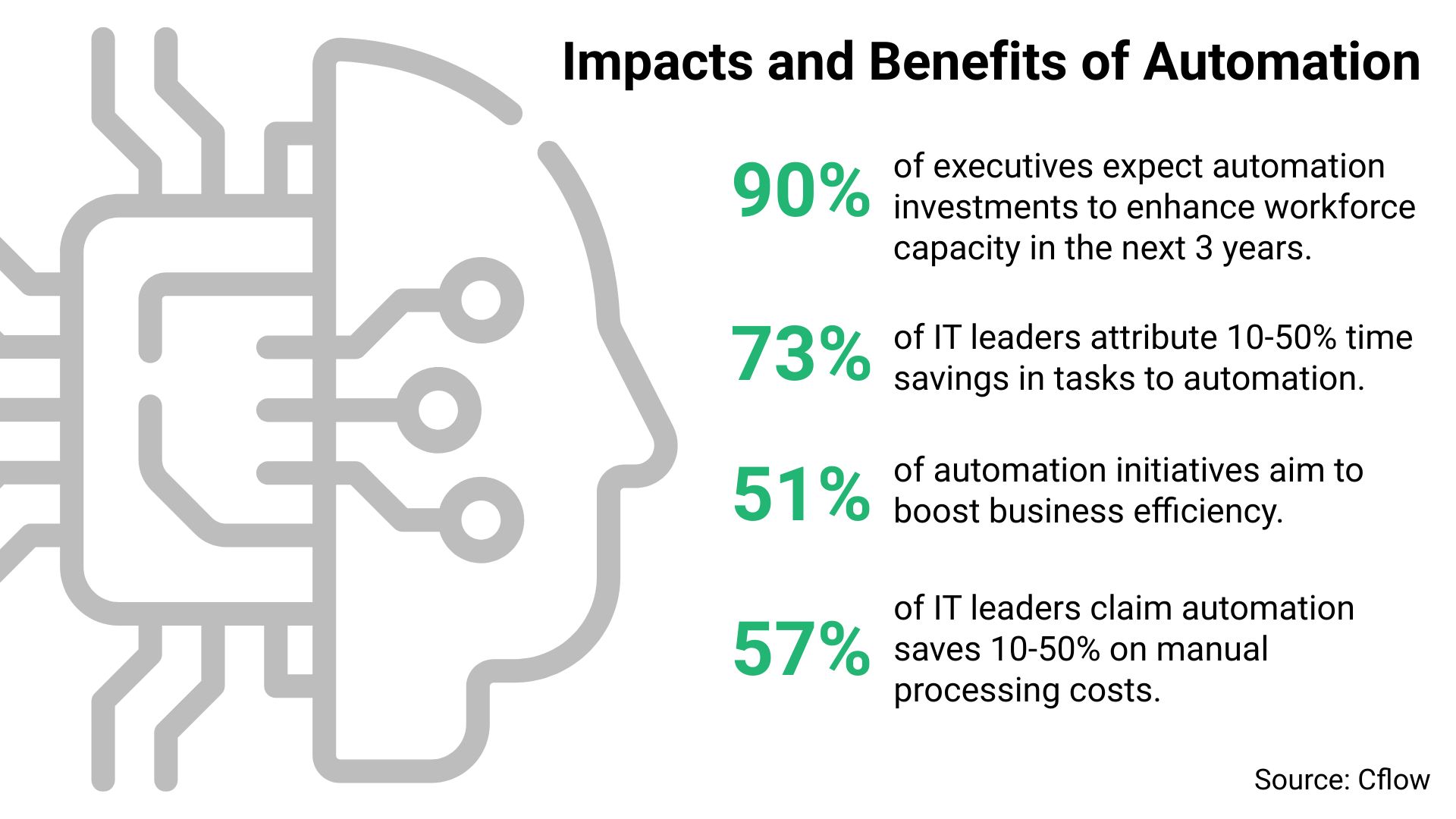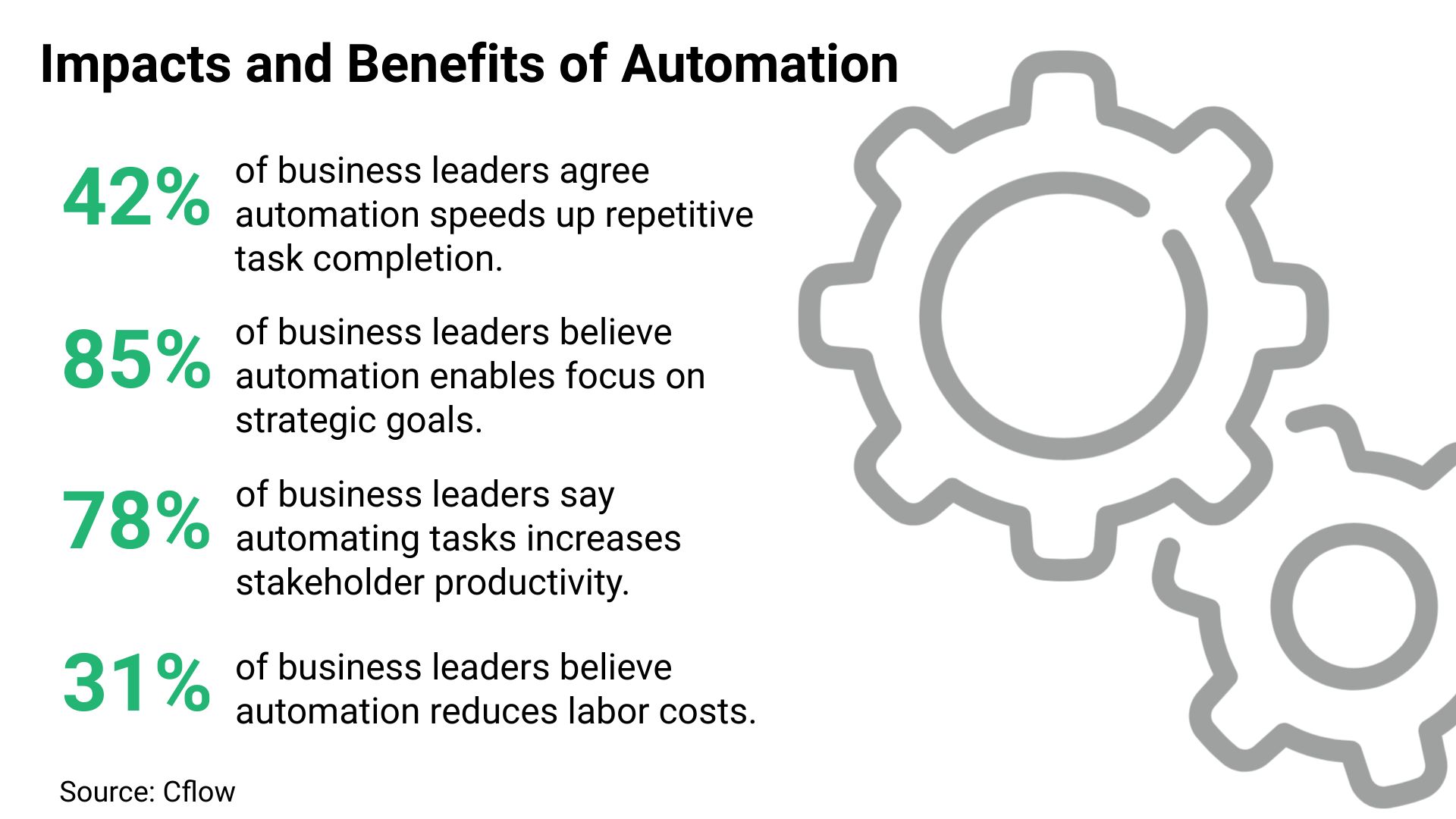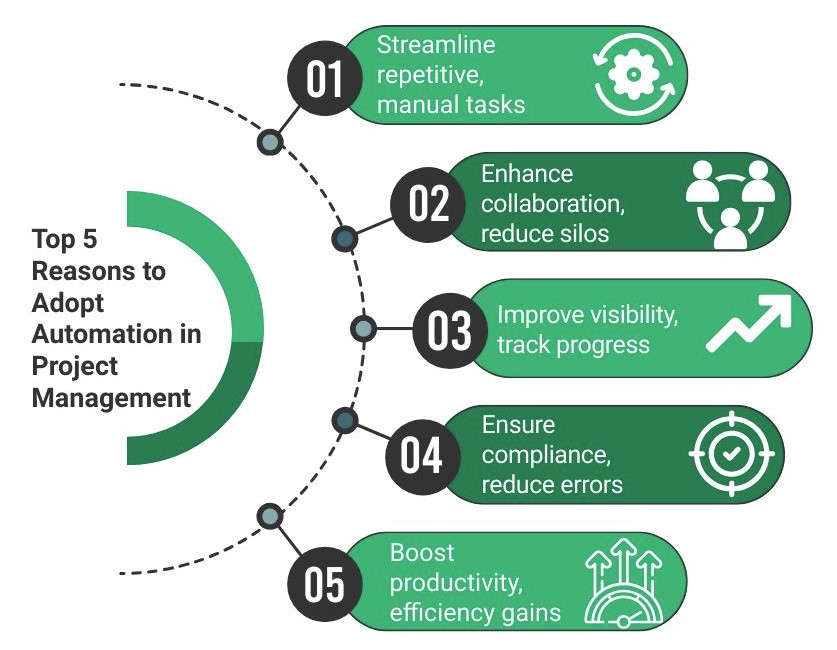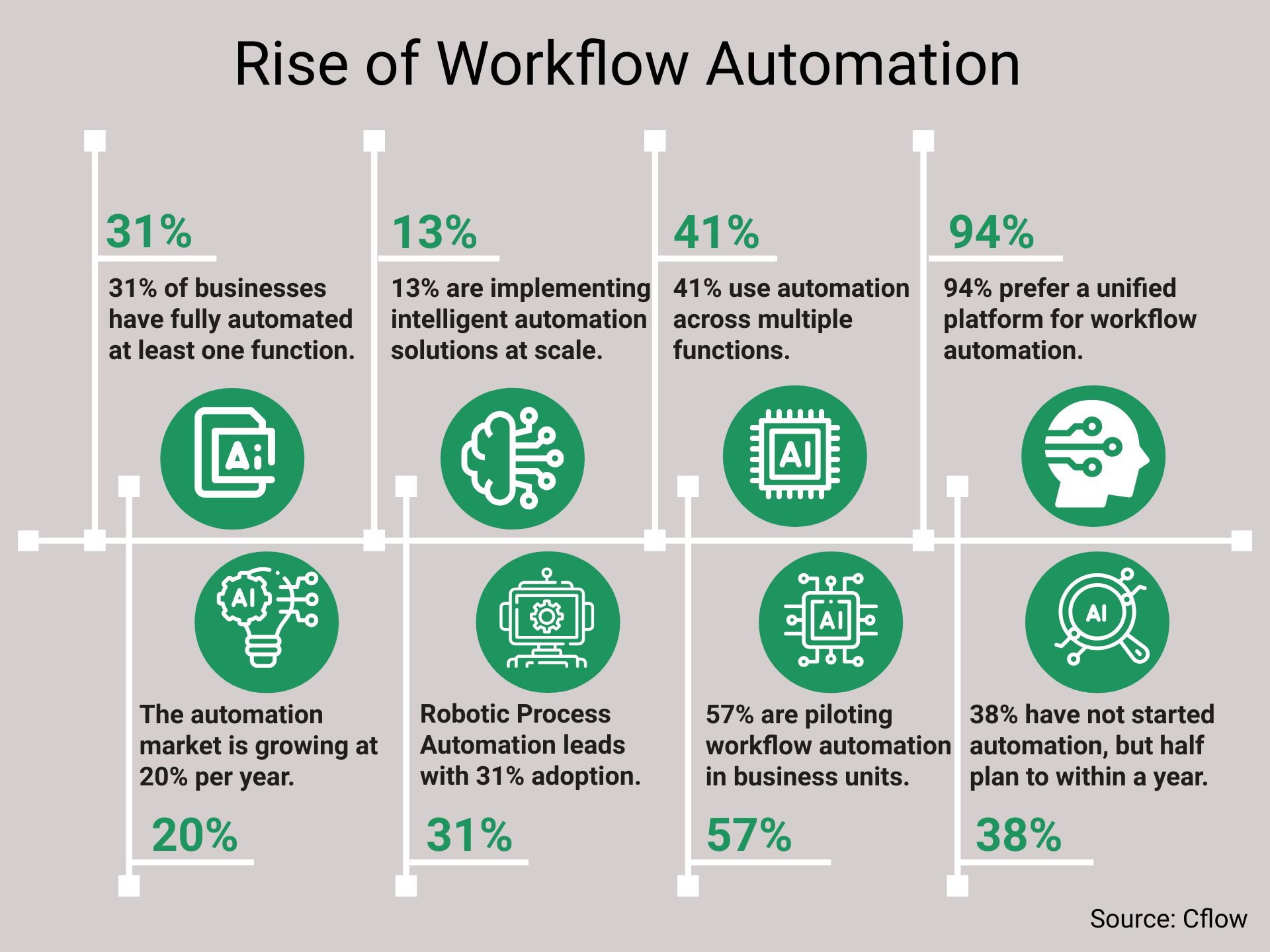
Isn't it amazing how a few clicks can revolutionize workflows? If you are handling multiple projects simultaneously, automation in project management should be at the core of your strategy. The numbers speak volumes - A staggering 54% of professionals leveraged automation solutions to save over 5 hours of work each week, according to a study. And get this: a whopping 80% of executives firmly believe that automation can be seamlessly integrated into any business decision, as revealed by Gartner's insightful research.
In project management, the possibilities for automation are vast and untapped. The transformative power of automation in project management showcases its ability to streamline processes, enhance efficiency, and unlock unprecedented productivity levels. Project execution is undergoing a revolution with the emergence of modern automation features. This article delves into the purpose of automation in project management, its advantages, key considerations, the automation initiation process, and real-world examples that exhibit how modern AI-powered solutions can elevate your project outcomes.
What Is Automation in Project Management?
The intricate management of projects —timelines, resources, budgets, and milestones —necessitates meticulous attention from project managers and teams. Beyond core task completion lies a complex web of planning, administrative processes, and ancillary functions. To optimize time management and achieve superior project outcomes, forward-thinking organizations strategically deploy automation in the project management domain.
This strategic shift reflects the ongoing digital transformation sweeping across industries. As companies embrace advanced AI-driven technologies, reliance on robust software solutions becomes paramount. Automation in project management offers a significant leap forward, enhancing visibility, streamlining workflows, and fostering seamless team collaboration. Integrating automation in project management enables increased efficiency and optimized project delivery.
The Purpose of Automation in Project Management
Automation in project management has emerged as a game- changer, revolutionizing how projects are executed and delivered. The purpose of automation in project management is crystal clear: to streamline processes, minimize manual interventions, and propel efficiency to unprecedented heights. By harnessing the power of AI solutions for automation in project management, project managers can reallocate their valuable time and resources toward strategic planning, decision-making, and effective stakeholder management.
changer, revolutionizing how projects are executed and delivered. The purpose of automation in project management is crystal clear: to streamline processes, minimize manual interventions, and propel efficiency to unprecedented heights. By harnessing the power of AI solutions for automation in project management, project managers can reallocate their valuable time and resources toward strategic planning, decision-making, and effective stakeholder management.
(The graphic above presents data compiled from Cflow, aggregating insights from various reputable sources.)
However, it's crucial to recognize that not every project management process warrants automation. A judicious approach entails assessing current workflows, identifying bottlenecks, and pinpointing areas where project management automation can catalyze transformation. Here’s what you must consider:
- Inefficient Workflows - If errors plague your existing workflows, missed deadlines, and inefficiencies, automation presents a powerful solution to rectify these challenges.
- Real-time Visibility - Projects that demand real-time visibility into progress and performance can benefit immensely from automation solutions that provide up-to-date information
 and proactive alerts.
and proactive alerts. - Resource Constraints - When faced with limited resources, whether it's a tight budget or a human capital shortage, project management automation can be a lifeline, enabling you to achieve more with less.
- Collaboration Challenges - Collaboration among project teams and stakeholders is the cornerstone of success. Automation solutions offering centralized communication and document-sharing solutions can foster seamless coordination and enhance team dynamics.
(The above graphic presents data compiled from Cflow, aggregating insights from various reputable sources.)
Automation in project management opens up many opportunities and offers various benefits. By embracing modern AI-enabled business solutions, organizations can enhance productivity, accuracy, and efficiency, propelling their projects to new heights of success.
Key Considerations for Automation in Project Management
Identifying the optimal processes for automation in project management is crucial for optimizing efficiency, accuracy, and time savings. Key characteristics to consider for project management automation are:
- Repetitive and Time-Consuming Activities - Tasks involving numerous manual steps, such as data entry, report generation, and document management, can significantly benefit from automation.
- High-Volume and Data-Intensive Tasks - Processes that handle vast amounts of data, such as data analysis, forecasting, and risk management, are prime targets for automation to alleviate manual challenges.
- Error-Prone Processes - Processes susceptible to errors due to manual interventions, like data entry or calculations, can be safeguarded through automation, ensuring heightened accuracy and reduced risk.
- Time-sensitive Deliverables - When projects must be delivered within stringent deadlines, automation streamlines workflows and enhances punctuality.
- Standardized Processes - Processes that follow consistent steps are prime candidates for automation, ensuring uniformity and minimizing deviations.
Leveraging emerging technologies like artificial intelligence (AI) and machine learning (ML) empowers organizations to bridge the divide between strategic visions and tangible outcomes. AI-driven process automation solutions harness the power of these cutting-edge solutions, enabling seamless execution of business objectives while mitigating risks associated with manual interventions.
When selecting a process automation solution, consider the following:
- Ease of Use - Prioritize user-friendly solutions seamlessly integrating with existing software systems and workflows, enabling quick adoption.
- Business Capabilities - Assess the solution's features to ensure it encompasses essential project requirements and aligns with your specific needs and goals.
- Implementation Speed - While preconfigured solutions offer a fast start, weigh their ability to meet critical functionality requirements against the need for long-term scalability and adaptability.
- Future Vision - Opt for solutions that accommodate your organization's growth trajectory and evolving automation needs.
- Solution Type - Evaluate integrated, self-designed, or end-user-focused solutions based on your requirements for prebuilt capabilities, customization, and ease of use for non-technical users.
- Business Alignment - Ensure your process automation goals align with your organization's overarching objectives, identifying processes ripe for optimization through automation.
- Scalability and Adaptability - Choose a solution that can scale effortlessly, accommodating increased workloads, team expansions, and new process requirements without compromising performance or functionality.
By carefully considering these factors, you can make an informed decision on the optimal process automation solution, propelling your organization towards sustained success in project management efficiency while harnessing the transformative potential of AI to bridge gaps between strategic intent and operational reality.
How to Start with Automation in Project Management
Once the processes ripe for automation in project management have been identified, a strategic approach is crucial. Here’s what you must do:
- Define Clear Goals - Establish well-defined objectives for automation, such as cost reduction, efficiency enhancement, or accuracy improvement. Clear goals enable measurable success.
- Implement Gradually - A phased approach is recommended rather than attempting to automate all processes simultaneously. Start with one or two processes, test the automation solutions, and scale up gradually.
- Invest in Team Training - Automation introduces significant changes, necessitating comprehensive training and support for seamless team adaptation. Address concerns, highlight benefits, and foster a culture of continuous learning.
- Monitor and Refine - Continuously monitor the effectiveness of automation, tracking metrics like efficiency, accuracy, and cost savings. Adjust and refine processes as needed to maximize the return on investment.
Using AI-enabled solutions for project management automation can greatly boost productivity, accuracy, and cost savings, leading to exceptional project success.
What to Automate in Project Management

Automation in project management is essential for driving efficiency, accuracy, and productivity in project management. By leveraging AI-driven solutions for project automation, organizations can revolutionize their project management processes and unlock new possibilities.
When it comes to the judicious implementation of automation in project management, the bottom line lies in comprehending the formidable capabilities that automation software can provide.
With the right AI solutions, organizations can spearhead a paradigm shift in the following critical domains:
- Data and Report Visualization - Automated dashboards provide tailored, real-time information to stakeholders, ensuring transparency.
- Project Progress Tracking - Enables precise monitoring of project status, facilitating prompt adjustments and minimizing disruptions.
- Notifications and Reminders - Sends timely alerts based on specific criteria, enhancing team accountability.
- Approval Workflows - Simplifies and centralizes approvals, improving collaboration and speeding up decisions.
- Task and Project Assignment - Uses intelligent algorithms for optimal task distribution, ensuring efficient resource use.
- Onboarding Process - Automates new member integration, promoting operational efficiency.
- Budget Tracking - Offers real-time budget insights, aiding in informed financial decisions.
This transformation requires evaluating current workflows to identify time-consuming processes suitable for automation. Implementing modern AI solutions will drive project management efficiency, positioning your organization for operational leadership.
(The below graphic presents data compiled from Cflow, aggregating insights from various reputable sources.)

Advantages of Automation in Project Management
In the dynamic business environment, automation in project management emerges as a game-changer, propelling organizations toward unprecedented overall success. By embracing modern predictive solutions and automation in project management, companies can unlock many advantages that streamline operations and foster a competitive edge.
Here are a few advantages of automation in project management:
- Enhances Productivity - Automation handles mundane tasks, freeing up employees to focus on creative and strategic work and boosting organizational progress.
- Facilitates Scalability - It enables companies to scale operations smoothly, allowing them to focus on growth, product enhancement, and market expansion.
- Ensures Accuracy - Automation reduces the risk of human error, ensuring data precision and reliability.
- Increases ROI - By improving efficiency, automation helps optimize resources and increase profits, enhancing the overall return on investment.
- Improves Visibility - Automated updates provide stakeholders with clear, real-time insights into projects, building trust and confidence.
- Raises Morale - Automating routine tasks allows employees to engage in meaningful work, enhancing job satisfaction and team spirit.
By harnessing the power of AI for automation in project management, companies can unlock extraordinary project value, drive efficiency, accuracy, scalability, and employee engagement to unprecedented heights, and ultimately position themselves as industry leaders in an increasingly competitive market.
Conclusion
Embracing automation in project management is no longer a choice; it's an inescapable necessity for achieving project success in today's rapidly evolving business landscape. Automation is crucial as it allows organizations to streamline processes, minimize human errors, and optimize resource allocation, unlocking unparalleled efficiency, productivity, and precision levels. Harness its power to stay ahead of the competition and deliver projects excellently. However, true transformation lies in combining automation with modern AI-powered analytical and predictive intelligence solutions. This potent combination enables project managers with proactive insights, identifying risks and roadblocks well before they escalate, ensuring timely course correction, and mitigating potential project failures.
By leveraging the power of automation and advanced analytics, organizations can understand project dynamics comprehensively enabling data-driven decision-making and proactive risk mitigation strategies. TrueProject emerges as a leading solution in this arena, offering a comprehensive suite of capabilities tailored for effective automation in project management. With its predictive intelligence for project health monitoring, advanced warning systems, and accurate status tracking, TrueProject equips you with the foresight to take proactive measures, preventing project problems before they impact your success. Moreover, its seamless data integration, customizable dashboards, and AI-driven analysis capabilities provide a holistic view of your projects, enabling data-driven decision-making, optimized processes, and efficient team collaboration. By leveraging TrueProject's powerful features, you gain a competitive advantage, positioning your organization at the forefront of project management excellence.
Leverage TrueProject's powerful features to gain a competitive edge, positioning your organization at the forefront of project management excellence. Automate with intelligence, stay ahead of the curve, and achieve resounding success.
More information on TrueProject at trueprojectinsight.com. 
About the Author:
Nisha Antony is an accomplished Senior Marketing Communications Specialist at TrueProject, a leader in predictive intelligence. With over 16 years of experience, she has worked as a Senior Analyst at Xchanging, a UK consulting firm, and as an Internal Communications Manager on a major cloud project at TE Connectivity. She is an insightful storyteller who creates engaging content on AI, machine learning, analytics, governance, project management, cloud platforms, workforce optimization, and leadership.
Endnotes
- Joe Demski. “All About Project Management Automation.” Quickbase: Sep 01, 2022. https://www.quickbase.com/blog/project-management-automation
- Ruzida. “Automation in Project Management: A Complete Guide.” ZenPhi: May 18, 2023. https://zenphi.com/automation-in-project-management-a-complete-guide/
- Salient Processes. “Benefits of Project Management Automation.” Salient Process: Feb 08, 2024. https://salientprocess.com/blog/benefits-project-management-automation/
- Meghan Rimol. “Gartner Survey Reveals 80% of Executives Think Automation Can Be Applied to Any Business Decision.” Gartner: Aug 22, 2022. https://www.gartner.com/en/newsroom/press-releases/2022-08-22-gartner-survey-reveals-80-percent-of-executives-think-automation-can-be-applied-to-any-business-decision
- Cflow Team. “Compelling Workflow Automation Statistics for Data-driven Business Decisions.” Cflow: Dec 20, 2023. https://www.cflowapps.com/workflow-automation-statistics/





